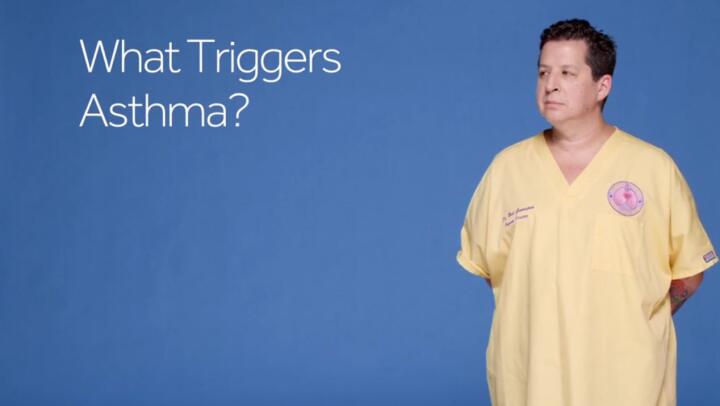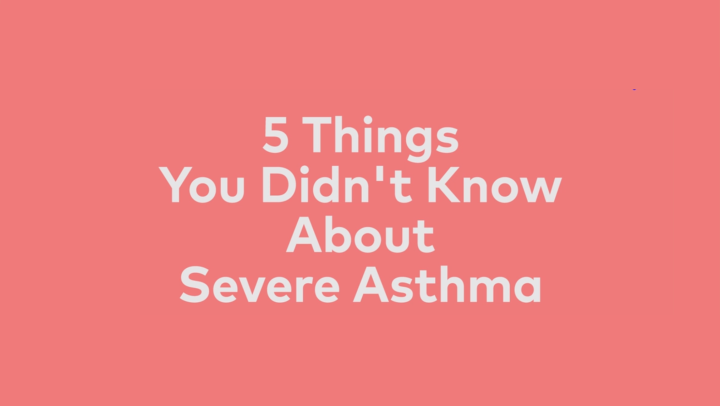11 Key Things to Know About Managing Severe Asthma

Medically Reviewed By William C. Lloyd III, MD, FACS
Written By Jennifer Larson on May 1, 2021
-
 Meet the challenges of managing severe asthma.Severe asthma, which is highly symptomatic asthma not well-controlled by typical medications, is a complicated condition. The chronic inflammation that’s typical of severe asthma can actually cause a remodeling of the airways inside your lungs, which leads to thickening and narrowing of those airways. It can also make your airways more hyper-responsive to triggers. This all makes severe asthma more difficult to manage than mild to moderate asthma. When you have severe asthma, learning how to manage your asthma symptoms is one of the most important things you can do to take care of yourself. It’s not a job that cannot be taken lightly. But you can meet the challenge and succeed—and in doing so, live a healthy, active life—if you keep these basics in mind.
Meet the challenges of managing severe asthma.Severe asthma, which is highly symptomatic asthma not well-controlled by typical medications, is a complicated condition. The chronic inflammation that’s typical of severe asthma can actually cause a remodeling of the airways inside your lungs, which leads to thickening and narrowing of those airways. It can also make your airways more hyper-responsive to triggers. This all makes severe asthma more difficult to manage than mild to moderate asthma. When you have severe asthma, learning how to manage your asthma symptoms is one of the most important things you can do to take care of yourself. It’s not a job that cannot be taken lightly. But you can meet the challenge and succeed—and in doing so, live a healthy, active life—if you keep these basics in mind. -
 1. An asthma action plan is vital.A carefully developed asthma action plan is your roadmap to managing your condition. You and your doctor should decide together the best treatment plan for you. The plan should include information on your typical symptoms, your medical history, the type of long-term medication you will be taking, and details on using a short-acting rescue medication when necessary. Your severe asthma action plan should also include provisions for monitoring your asthma on a daily basis, using a handheld device called a peak flow meter that can gauge how well you can push air out of your lungs. Your plan should enable you to live your life with the clearest lungs and fewest asthma symptoms as possible. An effective plan will also strive to help you avoid side effects from your medication.
1. An asthma action plan is vital.A carefully developed asthma action plan is your roadmap to managing your condition. You and your doctor should decide together the best treatment plan for you. The plan should include information on your typical symptoms, your medical history, the type of long-term medication you will be taking, and details on using a short-acting rescue medication when necessary. Your severe asthma action plan should also include provisions for monitoring your asthma on a daily basis, using a handheld device called a peak flow meter that can gauge how well you can push air out of your lungs. Your plan should enable you to live your life with the clearest lungs and fewest asthma symptoms as possible. An effective plan will also strive to help you avoid side effects from your medication. -
-
 2. It’s important to recognize signs of a severe asthma attack.Coughing, wheezing, tightness in the chest and shortness of breath are signs of a typical asthma attack. But a severe asthma attack can bring on additional symptoms, such as unusually rapid movements of your nostrils or a blue tinge around your face and lips, which is called cyanosis. You might also experience chest retractions—a condition that occurs when your skin begins to sink down between your ribs when you’re struggling hard to get enough air. Learn these signs so you can reach out for help right away.
2. It’s important to recognize signs of a severe asthma attack.Coughing, wheezing, tightness in the chest and shortness of breath are signs of a typical asthma attack. But a severe asthma attack can bring on additional symptoms, such as unusually rapid movements of your nostrils or a blue tinge around your face and lips, which is called cyanosis. You might also experience chest retractions—a condition that occurs when your skin begins to sink down between your ribs when you’re struggling hard to get enough air. Learn these signs so you can reach out for help right away. -
 3. Asthma can change over time.An asthma diagnosis is just the beginning of the journey. Believe it or not, asthma can change throughout your life, which can alter the way your symptoms manifest—and change the type of treatment you need. A treatment that worked to help you manage your symptoms of asthma a decade ago may not work as well for you today, especially since many people with severe asthma often experience a progressive decline in lung function. You may need to take different medications altogether or just adjust doses.
3. Asthma can change over time.An asthma diagnosis is just the beginning of the journey. Believe it or not, asthma can change throughout your life, which can alter the way your symptoms manifest—and change the type of treatment you need. A treatment that worked to help you manage your symptoms of asthma a decade ago may not work as well for you today, especially since many people with severe asthma often experience a progressive decline in lung function. You may need to take different medications altogether or just adjust doses. -
 4. You may have to take several medications.People with severe asthma tend to have trouble controlling their condition with typical treatments and will need to take several medications to maintain control. You will likely need a short-acting rescue medication for quick relief and a long-term control medicine that you take every day. You also may take corticosteroids often, or a biologic drug, such as omalizumab (Xolair) or mepolizumab (Nucala) that can get to the root of your asthma. Determining the best treatment and the right dose may require some trial and error. The first medication you try may not be the best one for managing your particular condition, or it may have certain side effects that you can’t tolerate. Also, you may have to undergo monitoring or other tests if you take certain medications. For example, leukotriene antagonists, like montelukast (Singulair), can raise your liver enzyme levels, so you may need occasional liver tests.
4. You may have to take several medications.People with severe asthma tend to have trouble controlling their condition with typical treatments and will need to take several medications to maintain control. You will likely need a short-acting rescue medication for quick relief and a long-term control medicine that you take every day. You also may take corticosteroids often, or a biologic drug, such as omalizumab (Xolair) or mepolizumab (Nucala) that can get to the root of your asthma. Determining the best treatment and the right dose may require some trial and error. The first medication you try may not be the best one for managing your particular condition, or it may have certain side effects that you can’t tolerate. Also, you may have to undergo monitoring or other tests if you take certain medications. For example, leukotriene antagonists, like montelukast (Singulair), can raise your liver enzyme levels, so you may need occasional liver tests. -
 5. Good control reduces the risk of future attacks.It’s worth taking the time for self-monitoring because you may be able to stave off future asthma attacks. You can check on your airways before symptoms occur. To do so, blow into a peak flow meter, which measures how fast you’re able to push air out of your lungs. If your peak flow meter shows that your numbers have dipped below the ideal range for you, you can take an appropriate amount of asthma medicine before symptoms worsen.
5. Good control reduces the risk of future attacks.It’s worth taking the time for self-monitoring because you may be able to stave off future asthma attacks. You can check on your airways before symptoms occur. To do so, blow into a peak flow meter, which measures how fast you’re able to push air out of your lungs. If your peak flow meter shows that your numbers have dipped below the ideal range for you, you can take an appropriate amount of asthma medicine before symptoms worsen. -
-
 6. Research about the cause is ongoing.We know that asthma is a complex health condition. Genetics, environmental conditions, allergens and other factors are all believed to play a role in causing asthma, and even more factors can exacerbate it. But one person might only have mild asthma while someone else struggles with severe asthma. If you’ve ever wondered why, rest assured that researchers continue to examine the possible causes of severe asthma. For example, experts now believe that higher-than-usual levels of white blood cells called eosinophils may be a cause of severe asthma. Allergic reactions can produce this condition, also known as eosinophilia, which can cause inflammation. That inflammation, in turn, causes progressively worse damage to your airways, including narrowing and thickening of the bronchial tubes inside the lungs, and a rapid decline in lung function. As a result, people with this condition find it extremely hard to control their asthma symptoms, giving researchers an impetus to study eosinophils further. Fortunately, new treatments are available to treat eosinophilic asthma and can provide relief to those who were out of options.
6. Research about the cause is ongoing.We know that asthma is a complex health condition. Genetics, environmental conditions, allergens and other factors are all believed to play a role in causing asthma, and even more factors can exacerbate it. But one person might only have mild asthma while someone else struggles with severe asthma. If you’ve ever wondered why, rest assured that researchers continue to examine the possible causes of severe asthma. For example, experts now believe that higher-than-usual levels of white blood cells called eosinophils may be a cause of severe asthma. Allergic reactions can produce this condition, also known as eosinophilia, which can cause inflammation. That inflammation, in turn, causes progressively worse damage to your airways, including narrowing and thickening of the bronchial tubes inside the lungs, and a rapid decline in lung function. As a result, people with this condition find it extremely hard to control their asthma symptoms, giving researchers an impetus to study eosinophils further. Fortunately, new treatments are available to treat eosinophilic asthma and can provide relief to those who were out of options. -
 7. Medical management options have expanded.It can be challenging for healthcare providers to find the right treatment regimen for a case of severe asthma. But the options today are better than they’ve ever been. For example, people with severe asthma now have the option of biologics. These drugs, which include the anti-IgE biologic omalizumab (Xolair) and the eosinophil-targeting drug mepolizumab (Nucala), target key cells and mechanisms that seem to drive the inflammation that’s so problematic with severe asthma. Another option for people with severe asthma who have maxed out the meds that they’re taking is an outpatient procedure called bronchial thermoplasty. Over the course of several sessions, a doctor threads a catheter into the lungs to treat the smooth muscle tissue in the airway. Afterward, you’ll still have to take your regular maintenance medication, but a successful procedure will keep your airways from narrowing too much and causing a severe attack.
7. Medical management options have expanded.It can be challenging for healthcare providers to find the right treatment regimen for a case of severe asthma. But the options today are better than they’ve ever been. For example, people with severe asthma now have the option of biologics. These drugs, which include the anti-IgE biologic omalizumab (Xolair) and the eosinophil-targeting drug mepolizumab (Nucala), target key cells and mechanisms that seem to drive the inflammation that’s so problematic with severe asthma. Another option for people with severe asthma who have maxed out the meds that they’re taking is an outpatient procedure called bronchial thermoplasty. Over the course of several sessions, a doctor threads a catheter into the lungs to treat the smooth muscle tissue in the airway. Afterward, you’ll still have to take your regular maintenance medication, but a successful procedure will keep your airways from narrowing too much and causing a severe attack. -
 8. Rescue inhalers are critical.Tempted to leave your rescue inhaler at home because you always take your long-acting medication and you’re feeling fine? Don’t. You may experience asthma symptoms that require a fast-acting treatment, and you don’t want to risk getting caught without your inhaler. A quick-acting medication—usually a beta-agonist like albuterol—will relax the smooth muscles in your lungs and help open up your airways.
8. Rescue inhalers are critical.Tempted to leave your rescue inhaler at home because you always take your long-acting medication and you’re feeling fine? Don’t. You may experience asthma symptoms that require a fast-acting treatment, and you don’t want to risk getting caught without your inhaler. A quick-acting medication—usually a beta-agonist like albuterol—will relax the smooth muscles in your lungs and help open up your airways. -
 9. You can still get a good night’s sleep.Severe asthma can make it hard to get a good night’s sleep. In fact, many people with severe persistent asthma routinely wake in the night due to asthma symptoms. The inflammation in your airways can get worse at night, along with changes in your body’s circadian rhythms and hormone fluctuations. But if you are diligent about managing your asthma and controlling your symptoms, you can worry less about waking up bleary-eyed in the morning.
9. You can still get a good night’s sleep.Severe asthma can make it hard to get a good night’s sleep. In fact, many people with severe persistent asthma routinely wake in the night due to asthma symptoms. The inflammation in your airways can get worse at night, along with changes in your body’s circadian rhythms and hormone fluctuations. But if you are diligent about managing your asthma and controlling your symptoms, you can worry less about waking up bleary-eyed in the morning. -
 10. It’s important to seek emergency care when necessary.Remember those symptoms of a severe asthma attack? If you’re developing a blue tinge around your lips or you’re struggling to breathe, don’t just try to ride it out, especially if you’ve already used your rescue inhaler and it hasn’t helped very much. Seek out emergency care right away.
10. It’s important to seek emergency care when necessary.Remember those symptoms of a severe asthma attack? If you’re developing a blue tinge around your lips or you’re struggling to breathe, don’t just try to ride it out, especially if you’ve already used your rescue inhaler and it hasn’t helped very much. Seek out emergency care right away. -
 11. Get a flu shot every year.Every year, you should roll up your sleeve for a flu shot. Experts strongly recommend that people with severe asthma receive an annual influenza vaccination to decrease the chances of contracting a potentially dangerous case of the flu. The flu can trigger asthma symptoms and even lead to the development of pneumonia. Even if your asthma is well-controlled, you are still at high risk for complications.
11. Get a flu shot every year.Every year, you should roll up your sleeve for a flu shot. Experts strongly recommend that people with severe asthma receive an annual influenza vaccination to decrease the chances of contracting a potentially dangerous case of the flu. The flu can trigger asthma symptoms and even lead to the development of pneumonia. Even if your asthma is well-controlled, you are still at high risk for complications.
11 Key Things to Know About Managing Severe Asthma

































